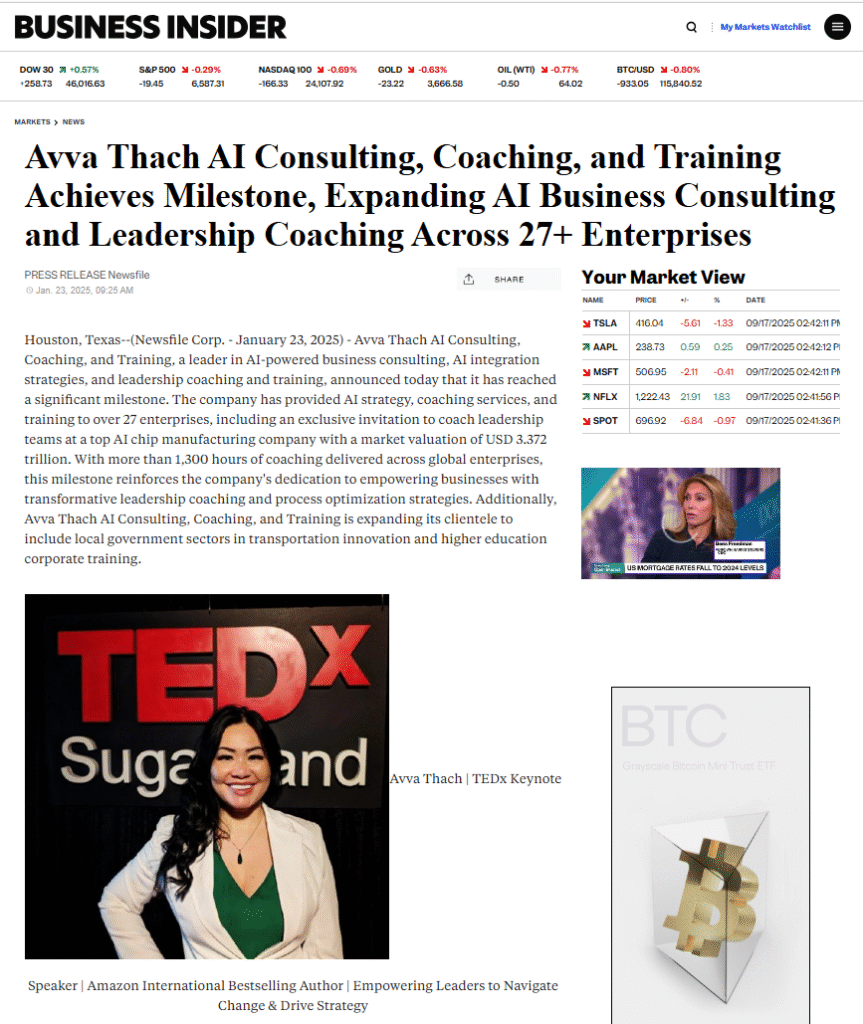In today’s fast-paced and ever-evolving business landscape, the role of an executive business coach has become increasingly vital. An executive coach serves as a trusted advisor, guiding leaders through the complexities of their roles while helping them navigate the challenges that come with high-level decision-making. This relationship is built on a foundation of trust and confidentiality, allowing executives to explore their thoughts, feelings, and strategies in a safe environment.
The coach’s primary objective is to facilitate personal and professional growth, enabling leaders to enhance their performance and achieve their organizational goals. Moreover, an executive business coach brings a wealth of experience and expertise to the table. They often possess a deep understanding of various industries and organizational dynamics, which allows them to provide tailored advice and insights.
By leveraging their knowledge, coaches can help executives identify blind spots, challenge assumptions, and develop new perspectives. This collaborative process not only fosters self-awareness but also empowers leaders to make informed decisions that align with their vision and values.
Key Takeaways
- An executive business coach plays a crucial role in guiding and supporting business leaders to achieve their full potential.
- Identifying areas for improvement and growth is essential for personal and professional development.
- Setting clear and achievable goals is key to driving success and maintaining focus in business leadership.
- Developing effective leadership skills is vital for inspiring and motivating teams to achieve their best performance.
- Enhancing communication and interpersonal skills is crucial for building strong relationships and fostering a positive work environment.
Identifying Areas for Improvement and Growth
The first step in any coaching relationship is to identify areas for improvement and growth. This process begins with a comprehensive assessment of the executive’s current situation, including their strengths, weaknesses, opportunities, and threats. Through various tools such as 360-degree feedback, personality assessments, and performance reviews, coaches can gather valuable insights that inform the coaching agenda.
This data-driven approach ensures that the coaching process is grounded in reality and focused on tangible outcomes. Once the assessment is complete, the coach works collaboratively with the executive to prioritize areas for development. This may involve addressing specific skills gaps, enhancing emotional intelligence, or improving strategic thinking capabilities.
By pinpointing these areas, executives can focus their efforts on what truly matters, leading to more significant and sustainable growth. Additionally, this targeted approach fosters a sense of accountability, as leaders are encouraged to take ownership of their development journey.
Setting Clear and Achievable Goals

Goal setting is a critical component of the coaching process. Clear and achievable goals provide direction and motivation for both the executive and the coach. Together, they establish specific objectives that align with the executive’s vision and the organization’s strategic priorities.
These goals should be SMART—Specific, Measurable, Achievable, Relevant, and Time-bound—ensuring that they are realistic and attainable within a defined timeframe. As the coaching relationship progresses, regular check-ins are essential to monitor progress toward these goals. This ongoing evaluation allows for adjustments to be made as needed, ensuring that the executive remains on track.
Furthermore, celebrating milestones along the way reinforces positive behavior and encourages continued commitment to personal and professional growth. By setting clear goals, executives can maintain focus and drive results that contribute to their overall success.
Developing Effective Leadership Skills
| Leadership Skill | Description | Importance |
|---|---|---|
| Communication | Ability to convey information clearly and effectively | Essential for team coordination and motivation |
| Decision Making | Capability to make timely and effective decisions | Impacts team productivity and goal achievement |
| Empathy | Understanding and relating to others’ emotions and perspectives | Builds trust and fosters positive work environment |
| Adaptability | Flexibility to adjust to changing circumstances and challenges | Enables effective problem-solving and innovation |
| Strategic Thinking | Ability to envision and plan for long-term goals and objectives | Guides organizational direction and growth |
Effective leadership is a multifaceted skill set that requires continuous development. An executive business coach plays a crucial role in helping leaders cultivate these skills by providing targeted feedback and guidance. This may involve enhancing decision-making abilities, fostering resilience in the face of adversity, or developing a more inclusive leadership style.
By focusing on these areas, executives can become more effective in their roles and inspire their teams to achieve higher levels of performance. Additionally, leadership development is not a one-size-fits-all approach. Coaches recognize that each leader has a unique style and set of experiences that shape their approach to leadership.
Therefore, they tailor their coaching strategies to align with the individual’s strengths and aspirations. This personalized approach not only accelerates growth but also fosters a sense of authenticity in leadership, allowing executives to lead with confidence and integrity.
Enhancing Communication and Interpersonal Skills
Communication is at the heart of effective leadership. An executive business coach helps leaders enhance their communication skills by providing insights into their communication styles and identifying areas for improvement. This may involve refining verbal and non-verbal communication techniques, active listening skills, or conflict resolution strategies.
By developing these skills, executives can foster stronger relationships with their teams and stakeholders, ultimately leading to improved collaboration and productivity. Moreover, interpersonal skills are equally important in building rapport and trust within an organization. Coaches work with executives to enhance their emotional intelligence, enabling them to navigate complex social dynamics with ease.
This includes understanding the emotions of others, demonstrating empathy, and adapting communication styles to suit different audiences. As leaders become more adept at managing interpersonal relationships, they create a positive work environment that encourages open dialogue and innovation.
Building a Strong and Motivated Team

A leader’s success is often measured by the strength of their team. An executive business coach assists leaders in building strong and motivated teams by emphasizing the importance of team dynamics and collaboration. This involves fostering a culture of trust where team members feel valued and empowered to contribute their ideas and perspectives.
Coaches guide leaders in recognizing individual strengths within their teams and leveraging these strengths to achieve collective goals. Additionally, motivating a team requires effective delegation and recognition of achievements. Coaches help leaders develop strategies for empowering team members by assigning responsibilities that align with their skills and interests.
By creating opportunities for growth and development within the team, leaders can cultivate a sense of ownership and accountability among team members. This not only enhances team performance but also contributes to higher levels of job satisfaction and retention.
Creating a Culture of Innovation and Adaptability
In an era marked by rapid change and disruption, fostering a culture of innovation and adaptability is essential for organizational success. An executive business coach plays a pivotal role in helping leaders cultivate this culture by encouraging creative thinking and risk-taking. Coaches guide executives in developing an open mindset that embraces change as an opportunity for growth rather than a threat.
Moreover, creating an innovative culture requires leaders to model adaptability themselves. Coaches work with executives to develop resilience in the face of challenges and setbacks, demonstrating how to pivot when necessary while maintaining focus on long-term goals. By fostering an environment where experimentation is encouraged, leaders can inspire their teams to think outside the box and contribute innovative solutions that drive organizational success.
Overcoming Challenges and Obstacles
Every leader faces challenges along their journey, whether they stem from internal dynamics or external market forces. An executive business coach provides invaluable support in navigating these obstacles by offering strategies for problem-solving and decision-making. Coaches help leaders develop a proactive mindset that anticipates challenges rather than reacting to them after they arise.
Additionally, overcoming challenges often requires resilience and perseverance. Coaches work with executives to build mental toughness, enabling them to remain focused on their goals despite setbacks or adversity. This resilience not only benefits the individual leader but also sets a powerful example for their teams, fostering a culture of determination and grit within the organization.
Leveraging Strengths and Addressing Weaknesses
A key aspect of personal development is recognizing one’s strengths while also addressing areas for improvement. An executive business coach assists leaders in conducting a thorough self-assessment to identify their unique strengths—those qualities that set them apart as effective leaders. By leveraging these strengths strategically, executives can enhance their impact within the organization.
Conversely, acknowledging weaknesses is equally important for growth. Coaches guide leaders in developing action plans to address these weaknesses through targeted skill-building or seeking support from others within the organization.
Implementing Strategies for Personal and Professional Development
The journey of personal and professional development is ongoing; it requires commitment and intentionality from both the executive and the coach. Together, they implement strategies that promote continuous learning and growth. This may involve setting aside time for self-reflection, seeking feedback from peers or mentors, or pursuing additional training opportunities.
Furthermore, creating a personal development plan is essential for tracking progress over time. Coaches help executives outline specific actions they will take to achieve their goals while also identifying potential barriers to success. By establishing clear strategies for development, leaders can remain focused on their growth journey while adapting as needed based on changing circumstances.
Measuring Success and Sustaining Growth
Finally, measuring success is crucial for ensuring that personal and professional development efforts yield tangible results. An executive business coach collaborates with leaders to establish key performance indicators (KPIs) that align with their goals. These metrics provide valuable insights into progress over time while also highlighting areas where further improvement may be needed.
Sustaining growth requires ongoing commitment beyond the coaching relationship. Coaches encourage executives to continue seeking feedback from peers and mentors while remaining open to new learning opportunities. By fostering a mindset of continuous improvement, leaders can ensure that they not only achieve their initial goals but also continue evolving as effective leaders in an ever-changing business landscape.
In conclusion, partnering with an executive business coach offers invaluable support for leaders seeking personal growth and organizational success. Through targeted interventions focused on skill development, goal setting, team building, innovation cultivation, resilience training, strength leveraging, strategic planning implementation, success measurement—and ultimately sustaining growth—executives can navigate challenges effectively while driving meaningful change within their organizations.
In the ever-evolving landscape of business leadership, the role of an executive business coach is becoming increasingly vital. As organizations strive to adapt to technological advancements, insights from articles like The Rise of AI: Creating Trillion-Dollar Companies and Shaping the Future highlight how AI is not only transforming industries but also redefining leadership strategies. Executive coaches are essential in guiding leaders through these changes, ensuring they harness the potential of AI while fostering a culture of innovation and adaptability within their teams.
FAQs
What is an executive business coach?
An executive business coach is a professional who works with executives and business leaders to help them improve their leadership skills, achieve their professional goals, and drive business success.
What does an executive business coach do?
An executive business coach provides one-on-one coaching and guidance to help executives develop their leadership abilities, enhance their decision-making skills, and navigate complex business challenges.
What are the benefits of working with an executive business coach?
Working with an executive business coach can help leaders gain clarity, improve their communication and interpersonal skills, enhance their strategic thinking, and achieve greater success in their professional endeavors.
How does one become an executive business coach?
Becoming an executive business coach typically requires a combination of relevant education, such as a degree in business or psychology, as well as specialized training and certification in coaching techniques and methodologies.
How can I find an executive business coach?
You can find an executive business coach by researching and contacting coaching organizations, seeking referrals from colleagues or industry associations, or using online directories and platforms that specialize in connecting coaches with clients.





















Leave a Reply